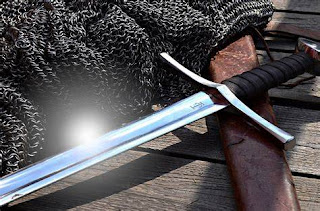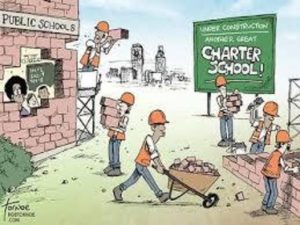Rick Hess (American Enterprise Institute) is one of those occupants of the reformy camp that I take seriously, even when I think he's wrong. So when he raises the question of whether or not school choice is an "attack" on public education, I think it's a question worth talking about, because I think the answer is a little bit complicated. So
let me walk through his recent piece on that very question bit by bit.
After an intro suggesting that opposition to choice expansion flows directly from the pandemic while ascribing choice to a shadowy cabal flows from teachers unions, Hess gets to his point, which is that seeing choice as an anti-public school is "misleading and misguided."
Hess puts choice in the context of a century's worth of public school fixer-uppers, "a barrage of reforms." He offers a list--"compulsory attendance, district consolidation, larger schools, smaller schools, magnet schools, standards, test-based accountability, merit pay, and more."
Some of these ideas were good. Some weren’t. But in hindsight, it’s pretty clear that they weren’t “attacks” on public education; rather, they were attempts to improve it.
I disagree. Some of these ideas were offered with sincere hope for the best. But I'm going to single out the standards movement and test-based accountability for special recognition here.
If you weren't teaching during the rise of No Child Left Behind, Common Core, and Race To The Top, I'm not sure if I can really capture for you the dawning sense of horror, frustration and futility among teachers at the time.
Word came down that new regulations required us to get test scores up-- a little bit per year for starters, then ramping up to an impossible climb, until somehow every single student would be above average. If not, there would be penalties, maybe the complete dismantling and rebuilding of the district, perhaps as a privately-run charter school. "This is not possible," educators said. "All will learn all," replied the Powers That Be. "Don't you believe that students can learn? And which child do you propose to leave behind."
Then there were the tests themselves. Not very good, and with results coming back with so little detail--and so very late in the game--that they were less than no help at all. "Well, if we just teach the standards, the tests scores will follow," said some optimistic educators. That didn't happen. Schools rejiggered curriculum, pulled students away from untested material like art and recess so that they could be double-whammied with test prep.
"Maybe Obama will fix it," we hoped. He did not. He doubled down. And 2014--the year for 100%--came closer and closer, the year when anyone dealing with educational reality knew that every district in the country would be either a) failing or B) cheating.
And through those years, one at a time or in small groups, teachers arrived at an unpleasant conclusion.
They are setting us up for failure. They want us to fail.
Why would they want that? The rhetoric had already been around on the far right, back all the way to Milton Friedman and on through his intellectual spawn--
public education should be dismantled. There was a new push for vouchers and especially charter schools, and that coincided with rising noise about "failing" public schools. There was very little "let's expand the educational ecosystem" and an awful lot of "we must help students escape failing public schools." The constant refrain of "school choice will force public schools to improve because competition" was also an omnipresent crock, a slap in the face to educators who were already working their butts off and resented the suggestion that they were either incompetent or lazy. And that thread runs all the way up guys like Christopher Rufo arguing that to get to universals school choice, you have to get to universal distrust of public schools.
Maybe school choice wasn't in and of itself an attack on public education, but it certainly seemed as if attacking public education was a means of promoting school choice.
I have no doubt that there are people who believe that education would work better if handled by the free market (I think their belief is magical, misguided and wrong, but I do believe it's sincere). I believe there are technocrats who believe that standards, tests and data would improve education (ditto).
But to be a public school educator on the receiving end of all this (and more) absolutely felt like an attack. The irony is that when reformsters eventually figured out that the attack-filled rhetoric wasn't helping and they dialed it back, the attacks themselves had become more real.
But let's get back to Hess.
Public education can encompass a lot of approaches, and it can be organized in many different ways. Rather than blindly insist that “defending public schooling” requires clinging to outdated policies from decades (or centuries) past, we would do better to clarify principles, examine particulars, and then debate proposals.
All of this language is doing a lot of work, but as far as it goes, Hess and I probably agree more than we disagree. But the disagree part comes in the very next paragraph.
Indeed, the pandemic was a stark reminder that there are lots of ways to deliver schooling, including innovations such as learning pods, microschools, virtual tutors, and education savings accounts.
Learning pods and microschools are okay if you're wealthy. As policy ideas in the vein of the DeVosian, "Well, your voucher may not be enough to get into a good private school, but you can always start a microschool," they suck. I don't think there are more than a hundred people in the country who came out of the pandemic thinking virtual education is a great idea. And education savings accounts are just vouchers with extra super-powers and porcine lip gloss. And none of these are really new ideas. They also all suffer from the same issue, which is the notion that any school choice system must be done free market style. We can do a great choice system without the free market at all (but that's a post for another day).
Hess identifies one of the issues as the fuzziness of the word "public." On this point, I think he gets some things wrong.
Choice opponents assert that public schools are “public” because they’re funded by public tax dollars.
No, that's choicers. It's been part of the charter school argument that charter schools are public schools because they are funded with public dollars. This pro-public ed writer (I'm not anti-choice, but I am anti-most-of-the-versions-of-choice-with-which-we've-been-presented) would say that public schools are public because they the public funds them, owns them, and operates them via representatives. Furthermore, they are public schools because they have a responsibility to the public to serve all students.
You can argue, as Hess and others do, that districts regularly hire outside firms to handle certain functions and occasionally outsource the teaching of certain students with exceptional special needs. But in all those cases, the responsibility for the management of those outside contracts rests with the public school district. A charter or private voucher-fed school carries no such responsibility. A public school district cannot, as can charters and voucher schools may, simply show parents the door and say, "Good luck. Your child is not our problem." Do all public systems meet that responsibility as well as they ought to? Absolutely not. But at least the responsibility exists. A parent who thinks the public system is short-changing their child can (and often will) sue the district. They have no such option in a choice system, as such systems are currently conceived.
Hess is correct in calling public education "a pretty expansive category." But it hinges on far more than whose money is being used.
In fact, I'd argue that it is the responsibility portion that is the big difference in the brand of choice being pushed by many these days. Our public system is based, however imperfectly, on the notion that we bear a collective responsibility for educating the young. Modern choice, particularly the current version sold under the culture warrior parental right brand, is about saying that getting a child an education is the responsibility of the parents, and that's it. Yes, many choicers are also trying to privatize the ownership and provision of education, but it is the privatizing of responsibility for a child's education that is perhaps the most profound and fundamental shift.
More importantly, simply calling something “public” doesn’t make it a good thing. While the phrase “public schooling” is suffused with happy notions of inclusivity and fairness, “public” isn’t a magic word.
Ain't it that truth. Public education has a wide variety of issues--though some of those are the direct result of reformster attempts to "fix" things (see above re: standards and testing). But I've never argued that I'm against modern school choice and ed reform because public schools are perfect the way they are and everything else sucks. My most fundamental issue is that public schools have some serious issues, and modern ed reform and school choice don't solve any of them (yes, that is also another long post). They just weaken public school's ability to work on them while blowing through a giant pile of taxpayer money.
The point isn’t to play word games but to understand that things are less clear-cut than defenders of the status quo are prone to acknowledge. There are many ways to provide and serve the aims of public education.
After all these decades in the ed biz, I'm inclined to assert, repeatedly, that everything in education is less clear-cut that the vast majority of people acknowledge. Some folks on my side of the aisle are quick to infer nefarious and/or greedy motives when, sincere ideology is sufficient explanation (much as some folks in the choice camp assume that the only reason someone would stick up for public ed is because she's on the union payroll). Some choicers are simply ignorant of how any of this school stuff works. Some are up against a particularly dysfunctional local version of public education. Some are anti-democrats for whom this is just one issue of many, one more way in which the government steals their money to spend it on Those People. Some want to recapture education for a particularly conservative version of christianist religion. Some want to social engineer their way to a more efficient society. Some are serious people, and some are not.
In short, the choicer and reformster camp contains a great variety of individuals.
Are some of those individuals interested promoting school choice as a way of making public education better? Is it possible to make public education better by incorporating some choice ideas? I believe that latter is true, and I swear I'm going to post about it in the not too distant future, and as for the former, well... yes, but.
But for all the variety in the choicer camp, they mostly adhere to two flawed premises-- that a choice landscape should rest on a bedrock of free market mechanics and that the resulting system shouldn't cost a cent more than the current one. As long as we start with those premises, school choice must be a zero sum game, and even if all the people who have spent the past four decades trying to tear public ed down so that choice will look better--even if all those people shut up, the zero sum game feature seems guaranteed to turn school choice into an attack on public education.





